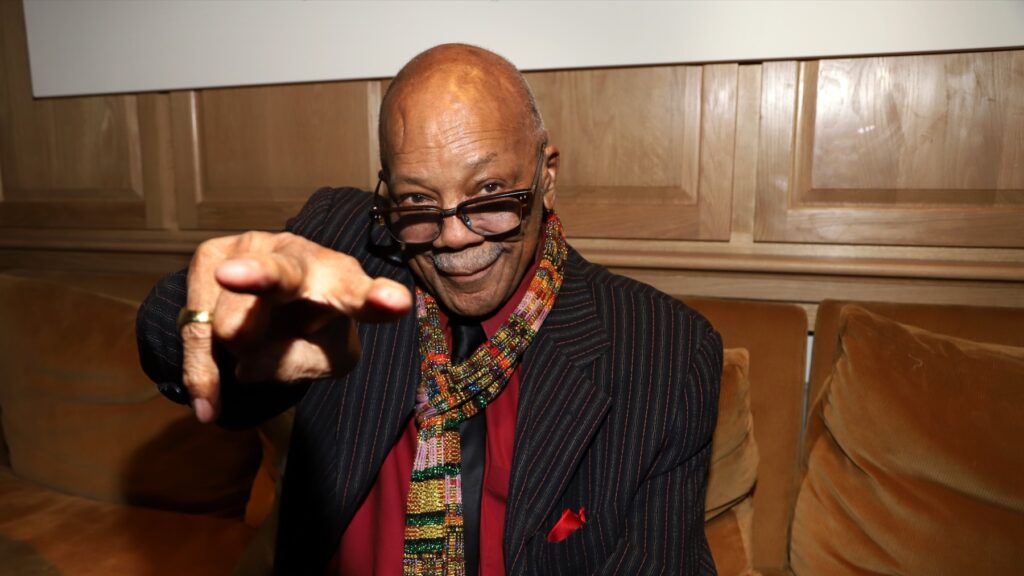Quincy Jones, the legendary record producer, composer, and multi-instrumentalist whose contributions to contemporary music spanned over seven decades and multiple genres such as jazz, pop, and hip-hop, has died at the age of 91.
“Tonight, with full but broken hearts, we must share the news of our father and brother Quincy Jones’ passing,” Jones’ family said in a statement. “And although this is an incredible loss for our family, we celebrate the great life that he lived and know there will never be another like him.”
Jones was one of the most celebrated icons in the music industry, garnering a record 80 Grammy nominations and 28 wins, including three Producer of the Year honors and two Album of the Year and Song of the Year awards each. His most recent win came in 2019 when Quincy, the semi-autobiographical documentary written and co-directed by his daughter Rashida Jones, took home Best Music Film.
As a producer and arranger, Jones was responsible for some of the most definitive records in the twentieth century. He produced Michael Jackson 1982 smash hit Thriller, which remains the highest-selling album of all-time, as well as its similarly successful 1987 follow-up, Bad. He collaborated with the top talents of every era including Dizzy Gillespie, Aretha Franklin, Ray Charles, Rufus & Chaka Khan, and Al Jarreau, and also helmed hit singles across genres like Lesley Gore’s “It’s My Party,” Frank Sinatra’s rendition of “Fly Me to the Moon (In Other Words),” and The Brothers Johnson’s “Strawberry Letter 23.”
Quincy Delight Jones Jr. was born in Chicago, Illinois on March 14th, 1933. He began to learn to play piano at a young age and eventually took up trumpet after his family moved to Seattle. He left Boston’s Berklee College of Music after one year in order to tour with jazz bandleader Lionel Hampton and subsequently relocated to New York City, where he became a freelance arranger for the likes of Ray Charles, Sarah Vaughan, Count Basie, Duke Ellington, Ella Fitzgerald, and more.
He released his first album in 1956 with This Is How I Feel About Jazz, but reached greater notoriety with successive releases like 1962’s Big Band Bossa Nova and 1971’s Smackwater Jack. He further explored genres beyond jazz and big band music in his solo output with 1973’s You’ve Got It Bad Girl, 1974’s Body Heat, and 1981’s The Dude. Jones’ 1989 magnum opus, Back on the Block, merged all of widespread sensibilities, including the burgeoning hip-hop style, and went on to win seven Grammys including Album of the Year.
In 1985, Jones assembled an A-list group of musicians, including Stevie Wonder, Tina Turner, Bob Dylan, and Paul Simon, to record the single, “We Are the World” for the non-profit organization USA for Africa. The song, written by Jackson and Lionel Richie, went on to raise $75 million for humanitarian relief in Africa and was awarded three Grammys, including Song and Record of the Year. Jones commanded the recording sessions with over 45 musicians, posting a warning at the entrance that read: “Please check your egos at the door.”
Jones was just as groundbreaking in the entertainment industry, becoming the first African American to be nominated for Best Original Song at the Academy Awards for “The Eyes of Love” in 1967’s Banning. As a film composer, Jones wrote memorable scores to In the Heat of the Night, The Italian Job, and The Color Purple, and he served as the musical supervisor on Sidney Lumet’s 1978 musical The Wiz, which introduced him to Michael Jackson and led to their partnership on 1979’s Off the Wall. In television, he scored indelible theme songs to Sanford & Son and Ironside, and later led his own production company, Quincy Jones Entertainment, which produced The Fresh Prince of Bel-Air and Mad TV.
Among many accolades, Jones received the Grammy Legend Award in 1992, the John F. Kennedy Center Honors in 2001, the National Medal of Arts from President Barack Obama in 2011, and was inducted into the Rock and Roll Hall of Fame in 2013 as the recipient of the Ahmet Ertegun Award. He attained EGOT status in 2016 as a producer to the Tony Award-winning stage adaptation of The Color Purple. Along with his numerous Grammy wins, Jones won the Emmy for Outstanding Music Composition for Roots in 1977 and was honored with the Oscars’ Jean Hersholt Humanitarian Award in 1994.

